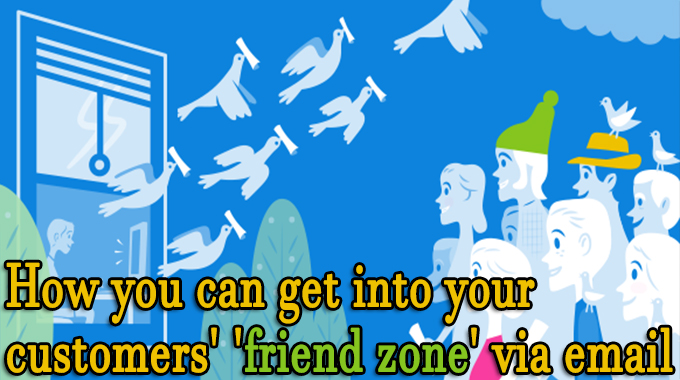How you can get into your customers’ ‘friend zone’ via email

Although email is one of the most effective ways to build relationships and nurture leads, only 21 percent of consumers surveyed said they had received memorable promotional emails within the previous few months. So what is the secret ingredient email campaigns can use?
For startups, the key to capitalizing on email marketing is simply to get more personal and familiar with customers.
Email is still a lucrative marketing tool, as the only costs associated with it are those that go toward the email service provider and the time it takes to build campaigns. What’s more, campaigns can be repurposed, automated or behaviorally triggered, running continuously with little additional effort.
Social media platforms not only wax and wane in popularity, but they’re also far less effective for customer acquisition than good old-fashioned email. The trick is to segment your customer base according to what people are doing in real time on a daily basis.
The death of the blanket email
Anybody can sell something and be a “brand” — but it’s much harder to earn loyalty. Not leveraged correctly, email can be pretty drab. Yet it doesn’t have to be: Adding value to your messages and not simply begging for sales will improve your brand’s impression among target customers.
Email is a great tool for reaching those consumers because you can incorporate cool images, copy or links and use increasingly novel technology to insert GIFs, small animations, timers and even dynamically inserted, location-based content.
This level of interactive personalization is invaluable for nurturing leads. For example, a co-worker told me that after looking at a dress on NastyGal.com, she received an email follow-up that said, “Hey, do you think I’m cute?” with a picture of the dress.
The ROI with such follow-ups can be strong because, once an email address has been acquired, the only real cost is whatever is spent on the platform and labor. Investing the time and energy to build-in this type of automation up front allows you to distribute evergreen messages with minimal effort.
Friends with benefits
Startups benefit from being perceived by their customers as friends, instead of just brands. And email is an effective and friendly way to get your business there — by collecting as much information as possible and targeting customers based on their individual actions.
Segmentation is much easier after your customer has established his or her purchase behavior, time on site and pages and products visited. And here, as paradoxical as it sounds, emails can be automated to appear “friendly.”
Engaging emails provide both an opportunity to communicate with potential customers about what they like and a low-risk method for gathering that invaluable customer data.
Want your own emails to customers to come across more as messages from a “friend” than a brand? Here are four strategies to use.
1. Deliver relevant content on a weekly basis. One of our clients, build.com, sends how-to emails (including video tutorials) to customers interested in home improvement. As soon as something episodic is sent, recipients quickly learn to expect and look forward to future helpful videos, and the whole interaction seems much friendlier.
This has proven to be a great tactic for increasing engagement because the brand is able to provide valuable, exclusive content, which seriously appeals to customers — especially when it offers solutions to their specific problems. Boring, generic newsletters just come off as lazy.
2. Develop an automated welcome series. Ninety-five percent of users who opt-in to company email lists find them useful. When consumers sign up for your list, send them discounts. If they don’t open that first email, send another with a new subject line, but the same type of message. If they open that email but don’t redeem the coupon, send one more asking why the coupon wasn’t used.
Even if each email contains the same basic message, continuous follow-up helps ensure that recipients actually open and use the discounts and that they visit your site in the process. Perverse Sunglasses, for example, goes beyond fostering friendship by sending behaviorally determined emails based on what products and styles individual customers look at online.
3. Collect birthdates and other demographic data — anything you can email about. Gathering information about gender, age and location is a must for targeting personalized messages at the right people. Sending birthday greetings and similar messages helps tailor content for different seasons, and can increase brand loyalty.
For example, Southern California doesn’t get too cold in the winter, so sending customers there emails about winter coats will likely be ineffectual. But, if New York has a snowstorm, why not send a timely email about your brand’s on-sale outerwear? Real-time, location-based promotional emails really help to personalize outreach while spreading brand awareness.
4. Mask the sender’s name. Change the name of the sender in order to get people more interested in opening your emails. Make sure the alternate name makes sense for your audience and aligns with your brand. A great example of a company that has a lot of fun with changing the sender name is Chubbies. For example, the company might send an email with a subject line that says, “Get your style game on for summer,” and the sender might be “Dad.” Recipients can’t help but ask, “What’s this?” and open the email out of curiosity.
The goal is to become a valued, trusted friend. Once you have done that, don’t forget to follow up and nurture those relationships — especially with those top customers who generate most of your profits.
___
by TONY DELMERCADO

